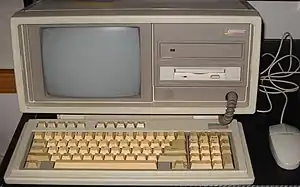Compaq Portable II
The Compaq Portable II was the third product in the Compaq portable series to be brought out by Compaq Computer Corporation. Released in 1986 at a price of US$3499, the Portable II was much improved upon its predecessors. It included an 8 MHz processor, and was lighter and smaller than the Compaq Portable. There were four models of the Compaq Portable II. The basic Model 1 shipped one 5.25" floppy drive and 256kB of RAM.[3] The Model 2 added a second 5.25" floppy drive and sold for $3599.[3] The Model 3 shipped with a 10MB hard disk in addition to one 5.25" floppy drive and 640kB of RAM for $4799 at launch.[2][3] The Model 4 would upgrade the Model 3 with a 20MB hard drive and sold for $4999.[3] There also may have been a 4.1 MB hard drive included at one point.[5] The Compaq Portable II was significantly lighter than its predecessors, the Model 1 weighed just 23.6 pounds compared to the 30.5 pounds the Compaq Portable 286 weighed.[3] Compaq only shipped the system with a small demo disk, MS-DOS 3.1 had to be purchased separately.[3]
 A Compaq Portable II with an aftermarket 3.5" floppy drive replacing the 5.25" floppy drive and cover over the drive it came with. | |
| Manufacturer | Compaq Computer Corporation, United States |
|---|---|
| Type | Portable computer |
| Release date | February 20, 1986[1] |
| Introductory price | $3499[2] |
| Operating system | MS-DOS 3.1[2] |
| CPU | Intel 80286 @ 6 or 8MHz (dual-speed)[2] |
| Memory | 256kB-640kB[2] |
| Storage | 360kB 5.25" floppy drive, optional 10MB hard drive |
| Display | 9" Monochrome monitor |
| Graphics | 720×350 (text mode), 640×200 (graphics mode) |
| Sound | PC speaker |
| Input | Serial mouse, 84-key keyboard, light pen[3] |
| Connectivity | CGA, composite, serial, parallel |
| Dimensions | 7.5" × 13.9" × 17.7" (10cm × 35.3cm × 45cm)[4] |
| Mass | 23.6 lbs (10.7 kg)[2] |
| Predecessor | Compaq Portable |
| Successor | Compaq Portable III |
There are at least two reported cases of improperly serviced computers exploding when the non-rechargeable lithium battery on the motherboard was connected to the power supply.[6] There were no recorded injuries. The Compaq Portable II was succeeded by the Compaq Portable III in 1987.
Hardware
The Compaq Portable II had room for additional after market upgrades. Compaq manufactured four memory expansion boards, 512kB and 2048kB ISA memory cards and 512kB and 1536kB memory boards that attached to the back of the motherboard.[4] With 640kB installed on the motherboard and both the ISA card and the expansion board, the computer could be upgraded with up to a maximum of 4.2MB of RAM.[2][4] The motherboard also had space for an optional 80287 math coprocessor.[4] There were two revisions of the motherboard, they were functionally identical although the earlier version was larger. The motherboard had four ISA slots for expansion cards, two 8-bit and two 16-bit. However, the first 16-bit ISA slot was occupied by a Multi I/O board with serial, parallel, PATA and Floppy interfaces, and the second 8-bit ISA slot was used by the CGA graphics card, leaving two available slots. The keyboard is hardwired in, but it uses standard PS/2 signaling, so a DIN or PS/2 socket can be retrofitted to allow use of common PS/2 keyboards (but not USB ones).
References
- Longeway, Barbara (21 Feb 1986). "Compaq makes Fortune 500, offers new line". Houston Chronicle. pp. Business 1.
- Lombardi, John (21 April 1986). InfoWorld. InfoWorld Media Group, Inc. pp. 58–59. ISSN 0199-6649. Retrieved 6 November 2012.
- Miastkowski, Stan (October 1986). "The Compaq Portable II". Byte Magazine. pp. 239–241. Retrieved November 29, 2012.
- Compaq Computer Corporation (1990). Compaq Portable II Personal Computer Maintenance and Service Guide (2 ed.). USA.
- CompaqVet (2006-10-18), "Portable 2 Compared to This Fish" - JOHN CLEESE Compaq Ad, retrieved 2018-10-22
- Mercury News Wire Services (21 Dec 1986). "Exploding portables spur compaq to set up toll-free line". San Jose Mercury News. pp. 2F.